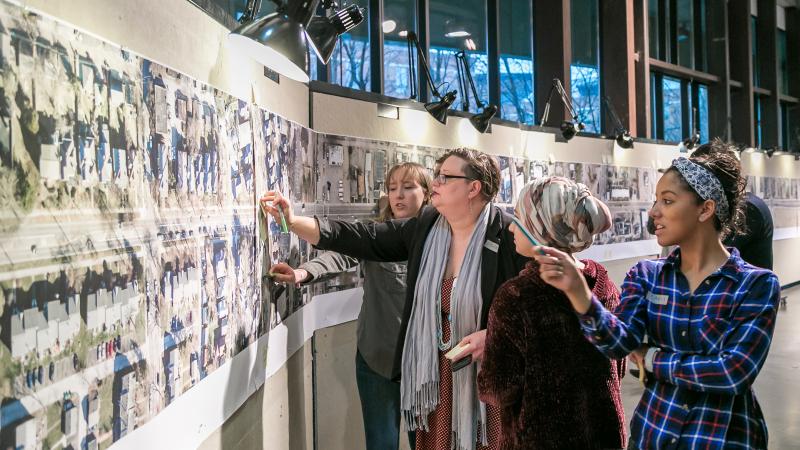Master of City and Regional Planning
With a professional planning degree, the opportunities to enact change are practically endless.

Master of City and Regional Planning
CTA Links: Request Info / Visit / Apply (MCRP)
Planning for Change
City and regional planning is a dynamic field that engages people and places in the design of vibrant, equitable, and resilient communities. Planners analyze the intersection of social and spatial systems to provide creative solutions in a multiplicity of focus areas—from transportation to environment to housing—at a range of scales.
City and Regional Planning at Knowlton provides expansive knowledge of the field and detailed understanding in specific focus areas grounded in practice. Students go outside the classroom for award-winning studios that engage local and regional clients, addressing existing challenges in transportation, sustainability, international development, and regional equity. Internships with local public, private, and non-profits provide year-round opportunities to see classroom ideas in action. International opportunities in East Asia, Europe, Latin America, and beyond enrich the degree experience with new and innovative perspectives.
The City and Regional Planning section is home to 18 full-time faculty as well as affiliated and associated faculty from diverse backgrounds in planning scholarship and planning practice. Affiliated faculty, lecturers, and guest speakers complement the teaching competencies of full-time faculty and add perspectives from planning practice and related specialties.
Planning Studios
Award-winning faculty and professional planners share their expertise and experiences in compelling and rigorous classes. A hallmark of planning at Knowlton is the experiences students have outside the classroom. Students participate in award-winning studios that engage real-world clients.
Planning studios engage students in a variety of academic and research activities that put ideas to work for communities. We believe that it is critical for students to learn how to effectively engage their communities in the design and planning process. All courses expose students to community engagement, critical thinking, and design-by-research as a way to inform planning policy and design. Studio courses are practice-oriented, focusing on comprehensive planning, urban design/physical planning, transportation, sustainability, or international development.
The goal of the planning studio is to develop deliverables that make a positive impact on socioeconomic conditions and human health factors while generating connections between social networks and the built environment.
Internships
MCRP students benefit from internship opportunities and studios that promote a culture of student engagement in the profession.
Through participation in internships, students learn to connect classroom learning with the practical work of the planning discipline while establishing valuable connections with planners in the field.
Learn more about the internship opportunities and career services for city and regional planning
From Neighborhoods to World Cities
Through on-site studios and internships, Columbus offers Knowlton students a chance to engage first-hand with the most pressing issues of a large and complex city and region.
Columbus is the center of a rapidly growing and diverse metropolitan area with over 2 million people. The area offers a wide range of housing, many cultural and recreational opportunities, excellent schools, and a strong economy
Learn more about Columbus
MCRP students are also encouraged to broaden their planning experiences with national and international travel programs and comparative research. Knowlton offers a variety of academic programs that engage them in planning experiences in Africa, Asia, Europe, and Latin America.
Learn more about graduate funding for travel
Accredited and Comprehensive
The Master of City and Regional Planning is accredited by the Planning Accreditation Board. Graduate Students take courses in several areas ranging from analytical methods like geographic information systems and data analytics to planning history and urban design. Students learn about communities, negotiation, urban design, civic innovation, and governance as well as infrastructure, transportation systems, land use, housing, and urban and regional economies.
Our MCRP program also prepares students for both roles in planning practice and research.
- Performance Indicators for the Master of City and Regional Planning
- Master of City and Regional Planning Strategic Plan
MCRP Funding and Support
The Master of City and Regional Planning provides financial support to students through a combination of fellowships, graduate associateships, teaching assistantships, and the signature MCRP professional internship program.
Funding awards vary based on merit, priorities, and program budget. Applicants are encouraged to apply before December 1 in order to be considered for the greatest number of potential funding opportunities.
Learn more about funding opportunities for current and prospective MCRP students
Graduate Minor in City and Regional Planning
The City and Regional Planning Section offers both an undergraduate and graduate minor. These minors are ideal supplements to studies in geography, landscape architecture, civil engineering, or other related disciplines.
Learn more about the Graduate Minor in City and Regional Planning
CTA Links: Request Info / Visit / Apply (MCRP)
Curriculum
The course of study for the Master of City and Regional Planning program consists of a foundation in the tools, methods, and theory of planning. Core courses focus on exploring the techniques for understanding and analyzing the built and natural environment. Seminars and electives provide students the freedom to explore areas of concentration and specialized topics. Studios focus on the application of planning, preparing students with final products for their portfolio. The internship allows students to apply what they are learning in the classroom in the real world, and to bring what they are experiencing in their internship back into the classroom. The program focuses on exposing students to the social, political, design, environmental, and fiscal realities of planning in preparation for a career that will adapt over time and respond to the changing world. The MCRP degree requires 48 credit hours of coursework and typically takes two years to complete. Students may also pursue the program at their own pace part-time.
Core Course Requirements
| Course Number | Course Title | Credits |
|---|---|---|
| CRPLAN 5001 | Introduction to GIS | 4 |
| CRPLAN 6000 | Planning History & Theory | 3 |
| CRPLAN 6200 | Data & Graphic Representation | 4 |
| CRPLAN 6300 | Law & Planning I: Land Use | 3 |
| CRPLAN 6400 | Site Planning & Development | 4 |
| CRPLAN 6500 | Plan Making & Analysis Techniques | 3 |
| CRPLAN 6600 | Spatial Models & Project Evaluation | 3 |
| CRPLAN 6191S | Professional Development I | 1 |
| CRPLAN 6191S | Professional Development II | 1 |
| 26 |
Studio Courses
Students are required to take at least one six-credit-hour studio course. It is recommended that students enroll in studio courses during the second year after they have completed a significant number of core courses.
| CRPLAN 6910 | Comprehensive Planning Studio |
| CRPLAN 6920 | Urban Design/Physical Planning Studio |
| CRPLAN 6950 | Transportation Studio |
| CRPLAN 6960 | Sustainability Studio |
| CRPLAN 6970 | International Development Studio |
Learn more about Knowlton Courses & Curriculum
Exit Projects
All MCRP students must complete a unique, independent, culminating project. Our program offers two options: a thesis and an applied planning research paper.
Thesis
The thesis is an independent research project that uses empirical, quantitative, or quantitative analysis to speak to a conceptual or practical planning problem. This option is best for students who wish to pursue further study beyond the MCRP degree or wish to further hone their planning research skills.
To complete the thesis, students must assemble a committee of at least two current faculty members. Students may opt to take fewer elective courses in lieu of thesis research credit hours.
Applied Planning Research Papers (APRPs)
These exit projects are comparable to the thesis but differ in that they are planning practice-facing. These projects are best suited to students who wish to deeply explore and analyze a topic or problem that they wish to have deep knowledge of before starting their post-MCRP planning careers.
To aid students in conceptualizing their APRPs, the faculty has defined five distinct types of APRP projects:
- Applied Research Paper
- Client-Project Paper
- Small Area Plan / Plan Update
- Urban Design and Physical Planning Project
- Specialized Project
To complete the APRP, students must engage a primary and secondary advisor. Students may opt to take fewer elective courses in lieu of applied planning research paper credit hours.
For more details on the exit project options, please consult the 2023–24 MCRP Handbook.
Areas of Focus
The MCRP program allows students to develop an area of focus or to pursue various interests through their elective options. Students choose their elective courses based on discussions with their faculty advisor and a review of the courses within the section and across the university.
Economic Development
Why do some cities and regions grow while others decline? Is all growth good? Under what conditions does economic development support sustainable and equitable growth? How does the built environment and the systems that operate within it (e.g., transportation, energy, land use) affect regional economic development?
The answers to these questions are crucial because economic development priorities and practices frame much of what is defined as profitable, desirable, and possible across all the domains of urban and regional planning. For example, whether to make infrastructure investments in high-speed rail or where to locate new affordable housing or a linear park.
Our approach at Ohio State is multidisciplinary by design, as the challenges that cities and regions face are complex ones that do not respect disciplinary boundaries or benefit from only one approach. City and regional planning is uniquely situated to tackle these complex, multidisciplinary challenges by integrating research from both planning and its cognate disciplines including economics, business administration and management, geography, public policy, sociology, and political science. With an MCRP focus on economic development, you will learn how to contribute to the long-term development strategies for communities and regions that balance economic prosperity, environmental sustainability, social equity, and resilience to external shocks.
Community Development and Housing
Our cities and towns are comprised of a network of neighborhoods and districts that provide amenities and resources such as housing, education, places of worship, access to food and nourishment, and connect communities of individually socially for improved quality of life. By understanding the strengths and strains of this ‘togetherness’, planners work to guide community or neighborhood development in ways that are inclusive, sustainable, and equitable. The specialization in community development and housing has a long tradition in city and regional planning. Community development research can focus on urban, suburban, or rural environments and includes issues such as leadership development, social capital formation, community economic development, infrastructure, or modification to the built environment or efforts to support community improvement in education, health, or employment.
Historically, many social issues in community development have had a housing dimension, including problems associated with racial segregation, slum development, poverty, and unemployment. Housing policy has traditionally been central to community development practice and is one of the most influential policy interventions to impact neighborhoods. Housing policies such as zoning laws, building codes, rent control, urban renewal, public housing, and fair housing regulations all impact the built and social environment. Housing includes the delivery of land, shelter, community facilities, and physical infrastructure. Topics of interest to students focusing on community development and housing include: increasing the supply of affordable housing, expanding homeownership among low-income groups, understanding the effectiveness of various incentives and constraints to encourage the development of safe and affordable housing, the relationship between socio‐demographic characteristics of people and their housing and neighborhood choices, or the effect of housing and neighborhoods characteristics on quality of life.
Urban Design and Physical Planning
The urban design and physical planning specialization aims to plan and design places that are environmentally, socially, and culturally sustainable, and are conducive to accommodate new people, new uses, and new buildings. It also includes the exploration of how urban sprawl and growth management can and do inform urban design and contribute to more resilient urban environments. This field covers scales from neighborhoods to metropolitan areas and addresses interrelationships between the physical environment, the built environment, and the social, economic, and political institutions and processes that shape urban areas. Students will learn methods, theory including environmental programming and research, geographic information systems, health impact assessments, social/cultural factors in environmental design, and application of information to the resolution of environmental design problems.
Environmental Planning and Sustainability
The Environmental Planning & Sustainability specialty allows students to pursue planning questions relating to the conservation, development, and restoration of socio-ecological systems, particularly (but not exclusively) in cities and regions. From the creation of green infrastructure to the preparation for natural hazards, individuals and communities interact with their environments in ways that include planning. Research in this area ranges from questions of the incorporation of sustainable development principles in plans and policies, the resilience of built and natural environments and their connections, the social, economic and environmental impacts of various activities, and questions related to the processes that produce plans for socio-ecological systems and their health consequences. It might also address energy conservation, generation, and infrastructure.
Transportation and Mobility
Transportation or movement across space is an integral part of the planning process. As new transportation technologies emerge in the 21st century, there is potential for significant changes in mode choice, travel behavior, goods movement, land use patterns, and infrastructure. The transportation specialization in the PhD program addresses these concerns through a variety of possible topics, ranging from measuring and providing access and equity, sustainable mobility, new mobility technologies and cities, understanding and projecting travel behavior, transportation policy making, mobility management, and system resilience. Our faculty has expertise studying mobility at diverse geographical scales (local, regional, and international) and with various travel modes (active modes, rail, air, transit, and autos).
International Development
International Development
The International Development concentration focuses on global perspectives and practices in countries and cultures around the world. Powerful global forces like trade, migration, governance, and technological change create opportunities as well as challenges for communities and regions around the world. When coupled with rapid changes in global climate, it becomes clear that planning for disruptive global change is more important than ever. Furthermore, the interconnectedness between human societies brought about by globalization makes understanding the international context an increasingly urgent objective for professional planners. This planning concentration includes lectures, studios, and study abroad opportunities related to all aspects of planning—urban design and economic development, transportation and infrastructure, food systems and public health, and land use and housing. Unifying themes in this concentration include sustainability, resiliency, and context sensitivity. Students will not only gain an understanding of international planning, design, and social aspects, but they will also learn how to analyze and apply best practices to communities in the U.S.
Dual Degree Programs
City and regional planning is inherently an interdisciplinary undertaking, and the MCRP program at Ohio State makes interdisciplinarity and academic collaboration easy.
Building the inclusive, sustainable, and equitable communities needed today will require the best work of many disciplines and the MCRP program encourages students to supplement their work in planning with dual degrees or graduate minors in African-American and African Studies, Civil Engineering (with a focus on Transportation Engineering), Environment and Natural Resources, Public Affairs, and Social Work. Some students may wish to gain further depth in a specialty area by opting for a second master’s degree.
Below is a list of common MCRP dual degree programs, but it is possible for students to arrange their own unique dual degree program. Students should discuss the idea of a dual degree with their faculty advisers and graduate coordinator early in their graduate careers to determine whether a dual degree is in their best interests.
Students interested in a dual degree program must be accepted into both programs and submit a proposed course of study to both programs for approval.
- Civil, Environmental and Geodetic Engineering Joint Program in Urban Transportation Planning (MS/MCRP)
- Environment and Natural Resources and Planning (MENR/MCRP)
- Environmental Science and Planning (MS/MCRP)
- Geography and Planning (MA/MCRP)
- Landscape Architecture and Planning (MLA/MCRP)
- Law and Planning (MSL/MCRP)
- Public Affairs and Planning (MPA/MCRP)
- Social Work and Planning (MSW/MCRP)
Explore Planning
Mac Lang Awarded Grants to Support Thesis Research
The awards will support the MCRP student’s research on incorporating Diversity, Equity, and Inclusion.
Harley Etienne Publishes University City Review
The associate professor of city and regional planning published the review in the Journal of the American Planning…
Jean-Michel Guldmann Publishes “Heat Mitigation Benefits of Urban Trees”
The professor emeritus and academy professor of city and regional planning published the article in the journal Forests.
Contact GChair, CRP
Harley Etienne
Associate Professor of City and Regional Planning,
Graduate Studies Chair
etienne.21@osu.edu



